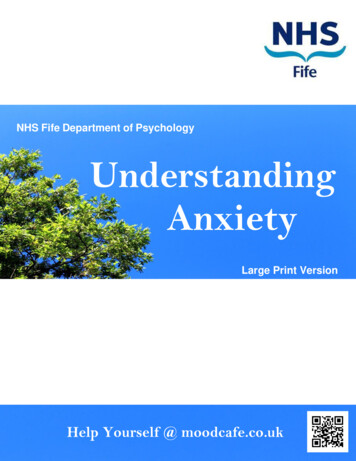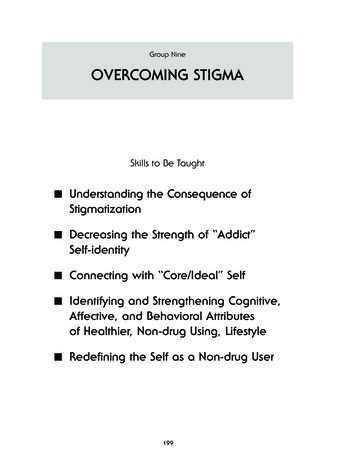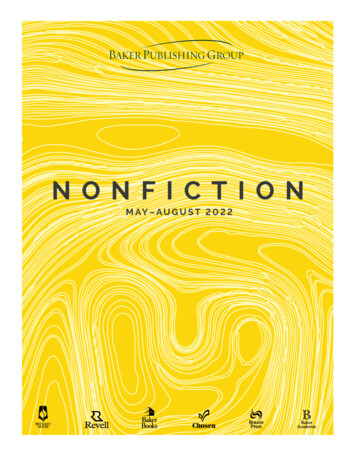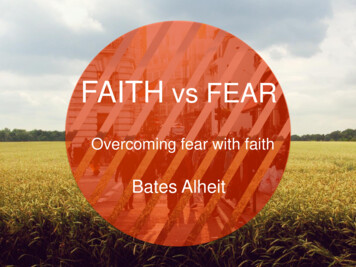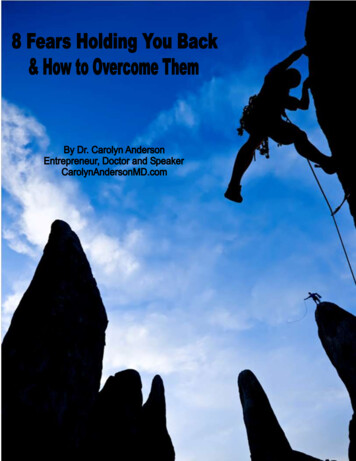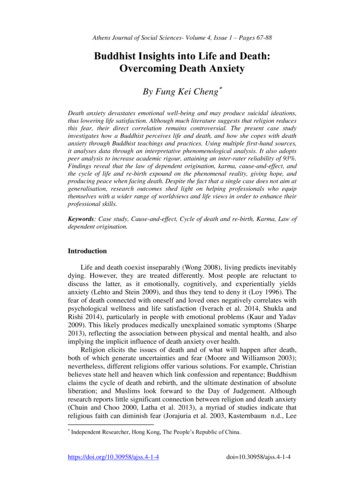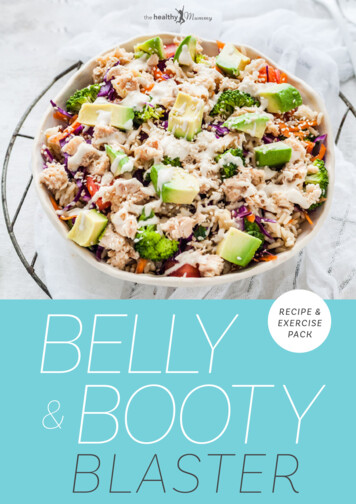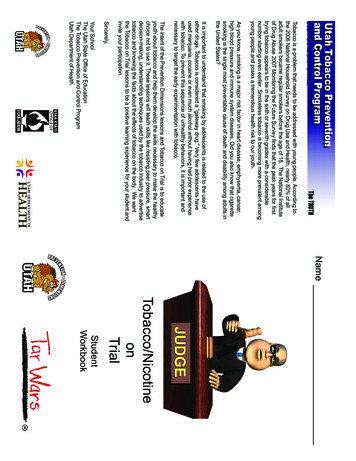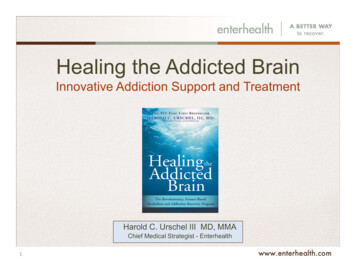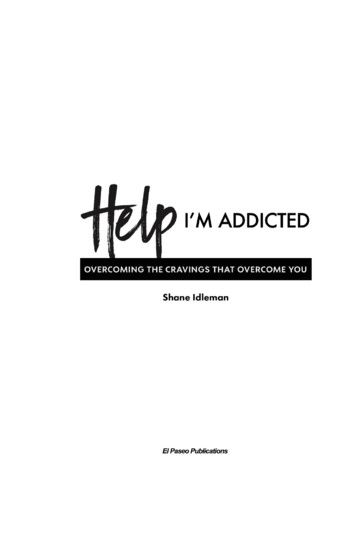
Transcription
HELP! I’m Addicted: Overcoming the cravings that overcome youCopyright 2020 Shane A. IdlemanAll rights reserved. No part of this publication may be reproduced or distributedin any form or by any means or stored in a database or retrieval system withoutthe prior written permission from the publisher and/or author.Scripture taken from the New King James Version . Copyright 1982 byThomas Nelson. Used by permission. All rights reserved.Scripture quotations marked (NIV) are taken from the Holy Bible, NewInternational Version , NIV . Copyright 1973, 1978, 1984, 2011 by Biblica,Inc. Used by permission of Zondervan. All rights reserved worldwide.www.zondervan.com The “NIV” and “New International Version” are trademarksregistered in the United States Patent and Trademark Office by Biblica, Inc. Scripture quotations marked (ESV) are from the ESV Bible (The Holy Bible,English Standard Version ), copyright 2001 by Crossway, a publishingministry of Good News Publishers. Used by permission. All rights reserved.Scripture quotations marked (NASB) taken from the New American StandardBible (NASB), Copyright 1960, 1962, 1963, 1968, 1971, 1972, 1973, 1975,1977, 1995 by The Lockman Foundation Used by permission. www.Lockman.org.Editing and typesetting by Liz Smith of InkSmithEditing.comISBN-13: 978-0-9713393-9-2ISBN-10: 0-9713393-9-2Published by El Paseo PublicationsPrinted in the United States of America
Help! I’m Addictediii
Dedication &Acknowledgments:To my wife, Morgan—You have been a tremendousmother and wife. Your love and strength continue to amazeme. You are a true Proverbs 31 woman. Thank you forencouraging me in this endeavor—you truly are a blessing.To my children—I pray that you make a huge differencein your generation.I also thank my mother Diane Idleman, who hascontinued to offer guidance and encouragement. Not only isshe a great mother but an exceptional editor and “bookdoctor.” The nine books I have written so far would not bewhat they are today had it not been for her insight. I thankher for the many days, nights, weeks, and months invested—may it return a hundredfold.Finally, this book is dedicated to all the families whohave dealt with the pain of addiction. I hope that God willuse this book to bring health, restoration, and deliverance.
ContentsDedication & Acknowledgments: .ivContents.vA Quick Word to Pastors.viDisclaimer.viiiAddiction: Hope for the Hurting.1Changing from the Inside Out.9Resisting Temptation—The Impossible Is Possible.20The Fully Surrendered Life.29The Cost of Addiction.36The Power of the Renewed Mind.50Overcoming Regret: Hope for the Prodigal.58Pushing through Withdrawals.64The Gift of Health .71The Truth about Alcohol .84Depression and Mental Illness: 5 Things You Need toKnow.91
A Quick Word to PastorsWe have a form of microwave Christianity. Service timesare cut to just over an hour, prayer is glanced over, andworship is designed to entertain the masses. “People arebored,” they say, “so our services need to be moreappealing.” You can increase attendance with slick marketingand entertaining programs, but you may miss the heart ofGod. The church will be a mile wide but only an inch deep.As Martyn Lloyd-Jones said decades ago, “Are we giving theHoly Spirit an opportunity? Are we so tied by our programsthat He is excluded? Why this formality?”1 These types ofservices will not help those in the throes of addiction orbondage.To truly help people, we can have schedules for the flowof the services, but we shouldn’t be clock watchers. Haveworship, but allow God to move. Prepare a message, but beopen if God desires to change it. Have a time of prayer, butdon’t be in a hurry. Why not go into worship and prayer andlet people respond to the message? Breakthroughs cannot berushed; we must spend time seeking God.Why are a large portion of Christians in the Westdesensitized to strongholds in their lives? Why is there ageneral lack of conviction? Carnality not only affects the pewbut the pulpit as well. A carnal pastor still offers motivating1Martyn Lloyd-Jones, Revival (Wheaton, IL: Crossway, 1987), 77.
Help! I’m Addictedsermons, but he will lose unction, boldness, and spiritualinsight. The world and carnal Christians will love him, butSpirit-filled believers will leave the service starving for moreof God.Pastors, if we would make it our goal to know Christmore personally, we would preach Christ more powerfully.Are we calling people out of the deceptive cultural mindset,or are we encouraging sin by our silence?vii
DisclaimerThis book was written based on personal experience andobservation and is published with that understanding. Theviews expressed in this book should not replace professionalmedical advice. If professional assistance is required, theservices of a capable authority are recommended. Thepurpose of this book is to motivate, educate, and encouragesuccess. The publisher, El Paseo Publications, and theauthor shall be neither responsible nor liable to any personor entity with respect to damage caused, indirectly ordirectly, from the information provided in this book.Information and website links are current up to theprinting date. Neither the author nor the publisher endorsesall the references from outside sources in this book. Relatedsermon links are provided for eBook users—simply click theembedded sermon link. If you are reading the printedversion of this book, you will need to manually input the linkinto your browser the next time you are online. Some of thecontent from this book has been pulled from Shane’s otherbooks.
You knew this would happen.How many times were you told?But you challenged my power.You chose to be bold.You could have said “no,”and then walked away.If you could live that day over,now what would you say?—Unknown Author
Changing from the Inside Outx
1Addiction: Hope forthe HurtingWe are at a crossroads. Opioid and alcohol abuse areleaving a path of destruction in their wake. Pornography isdesecrating families. Obesity is skyrocketing—plaguingmillions and reaching epidemic levels in children. Heartdisease and cancer are, by far, the leading “killers” inAmerica.1 And on and on it goes, from nicotine to caffeine tofood. As a society, we are out of control. But are thereanswers? Yes, there are, if we once again set our sights onGod’s truth.How can one book address opioids, alcohol,pornography, caffeine, gluttony, and all other forms ofaddiction? Wouldn’t each need a volume of their own? Whileeach addiction can be elaborated on, at the heart of addictionrests a common denominator known as a stronghold. Thisbook focuses on weakening the strongholds in your life.1Murphy, Xu, Kochanek, Arias, “Mortality in the United States, db328-h.pdf.
Changing from the Inside OutAddiction truly is hell onearth—you’reenslavedbut Believing a lie is always the firstdesperately want freedom, you’restep in the wrong direction.bound but can’t break free, you’rein tremendous pain but can’t find relief. If you can relate,don’t worry, there is hope. If you feel you “just can’t quit,” Ibelieve that you can. There is hope for the hurting.I have been addicted to many things, from coffee tosugar to alcohol, but alcohol was the most dangerous for me.I learned this lesson the hard way. When I first quit drinking,I stayed away from it for years. Then I thought I could drinkon special occasions because it didn’t seem to be an issue forme anymore. But because of my problem with alcohol as ayoung adult, the addiction was ready to take hold of meagain. It took a few embarrassing situations for me to finallyrealize that my supposed “liberty” was really waking adormant addiction.Some days the desire to drink was difficult—it would lastfor hours until I finally surrendered to the temptation. Themore I surrendered, the stronger the desire would become.Complacency led to apathy and, eventually, to compromise. Iwould rationalize, Others are doing it, why can’t I? Thismindset kept leading to failure. Believing a lie is always thefirst step in the wrong direction. I began to think, If Godreally loved me, He wouldn’t let me do this, or I’ve had ahard day. I deserve to relax. Excuses kept me in a cycle ofdefeat, failure, and shame.It was one of the darkest periods of my life. I was quicklylosing hope. “God, please take this away,” was my weekly cry.After finally hitting a low point, I began to seek God ferventlyand unconditionally. I asked a friend who had been through2
Help! I’m Addictedit before for help. His advice was simple yet life-changing:“You say no and let God handle the rest.”I realized that I had to cooperate in the process ofchange, avoiding people and places that triggered theaddiction. And I had to confess my sin and repent of it. Thecommon denominator in all my problems was me. CharlesSpurgeon rightly noted, “We are never, never so much indanger of being proud as when we think we are humble.”2We all must beware of pride and false humility.I told a few trusted friends about my struggle and,although it was difficult, apologized to those who had beenaffected by my decisions. Pride is at the heart of addictionand must be crushed. Honesty, transparency, prayer, anddisclosure are essential. Sin grows in darkness and loves thecover of night. Once exposed, it loses much of its power.While confession to others was humiliating andembarrassing, a great load was lifted. However, the strugglesdidn’t immediately vanish.I also had to put an end to compromise. Saying, “I’ll justhave one,” tripped me up every time. I was doing the samething but expecting different results—the classic definition ofinsanity. But when I focused on humility and accountabilityand decided to fight the demonic influences rather thansuccumb to them, victory was no longer elusive. I concededthat only God could change me. Full surrender is notoptional. In this battle, we must surrender to win.Once I did my part, God did His. By God’s grace, Hestopped the train before the wreck. Quitting was not easy,and the desire to drink did not leave right away. It was a2Charles Spurgeon, “Humility,” The Spurgeon Center, accessed October 10,2019, humility#flipbook.3
Changing from the Inside Outbattle, and anyone who has been there knows that. The firstthirty days, for example, can be extremely difficult. But don’tgive up—look up.Important Recap: Regardless of what your strongholdis, the points just mentioned are critical to success. Let’sbriefly revisit them:1. Remove excuses.2. Avoid triggers.3. Own it and repent.4. Apologize and repair the damage.5. Crush pride before it crushes you.6. Don’t entertain compromise.7. Admit your dependence on God, and fully surrenderto Him.Why wait? The train wreck could be just around thebend.Sober but Not SavedThe most successful recovery groups are those built onbiblical principles such as confession, repentance, andhumility—admitting that we are powerless over addictionand realizing only God can restore us to sanity. We mustdecide to turn our lives completely over to Him (fullsurrender). We also must admit that our lifestyle is wrongand, when possible, make amends with those we haveinjured (humility and repentance).I thank God for recovery groups, but unless a personturns to the one true and living God, they will be sober but4
Help! I’m Addictednot saved. We can’t just say, “God, as I understand Him,” or“a Higher Power”—we must confess Him as Lord and Savior.He is our only hope.This really hit home for me some time ago. I had theprivilege of attending a recovery meeting while doingresearch for this book. The guest speaker had over twentyyears of sobriety, but she was suicidal, depressed, andconfused; early childhood abuse had left her broken andshattered. Instead of offering listeners hope, her messagewas downright depressing. She was mad at God and madesure we all knew it. My heart truly broke for her—she wassober but not saved. This event motivated me to completethis book and help others find freedom and wholeness, notjust sobriety. What does it profit us to gain the world [or findsobriety] yet lose our soul (Mark 8:36)?We hear a great deal about God’s judgment and what cankeep us from heaven, and rightly so, because “the fear of theLord is the beginning of knowledge” (Proverbs 1:7). But wealso need to reflect on God’s goodness, love, mercy, andgrace.Jesus healed my brokenness and restored my life, andHe can do the same for you. A deep longing is inside all of usthat cannot be satisfied until we recognize our need for aSavior, repent of our sin, and turn to Him. Once you do this,your past is forgiven, your present secure, and your futurecertain. Through Christ, you are a brand-new person. If youtruly grasp this truth, it can motivate and encourage youbeyond measure. Though the road ahead may be uncertain attimes, the solid ground beneath will never shift. It’s all aboutWho you know. (The next chapter will go into more detail onthis.)5
Changing from the Inside OutChildhood Trauma: Stepping-stone or StumblingBlock?I’ve been told that I have a form of post-traumatic stressdisorder (PTSD) because of suffering in early childhood froman angry father. This allowed me to excuse my actions formany years. I loved my father, who is now deceased, andappreciated his work ethic learned on the farms ofOklahoma, but he also brought a lot of anger into our family.His addiction to caffeine and nicotine—along with beingan unbeliever—was a big part of the problem. Our house waslike a volcano waiting to erupt. When people use the phrase“walking on eggshells,” I know exactly what they mean. Todeal with the pain, I took my first drink at twelve then begandrinking consistently around the age of sixteen.I also used food for comfort and began to gain weightearly on. I still remember the headline underneath mypicture in our junior-high yearbook: Stuffed Pig. I was in ared wagon, with an apple in my mouth, being pulled aroundbecause I had just broken my leg. This was the triggeringfactor for my future steroid use and weightlifting; I shot uppast 270 pounds and was bench-pressing over 400 pounds inmy early twenties. My “I’ll show you” mentality fueled thislifestyle of destruction.As a child, I tended to isolate myself to prevent futurepain. I became an approval seeker; something you wouldfind hard to believe if you heard my preaching. Angry peoplescare me, and personal criticism hurts more deeply than itshould. To my knowledge, my father never told me he lovedme, but I know he did. He died at the early age of fifty-four.6
Help! I’m AddictedThe deep pains of childhood can follow us, and theenemy of our soul will use them against us. Thankfully, Godmakes provision for all our needs through His Word. Hemust be our anchor and our true source of hope. However,those who are enslaved often do the reverse—they turn to theaddictive substance rather than to God. One of the greatestlessons I learned is that we can either fully yield to God orwe can yield to sin. We are not robots on autopilot. We havebeen given the enormous responsibility of choice, and wemust be accountable to our actions. We make a choice, thenthe choice makes us.I want to pause for a moment and use this opportunity tospeak to the parent caught in addiction. God loves you andwants you to turn from your destructive lifestyle. The choicesyou make today will dramatically impact your kids in thefuture (as well as your physical and spiritual health). Sadly,many babies are born addicted to opioids and will experiencepainful withdrawals. The cycle of addiction must stop, and itbegins with you.Don’t let past pain continue to pull you down; use it as astepping-stone. It’s been said that shepherds from time totime would break the leg of a lamb that continually wanderedfrom the flock and the shepherd’s protection. The shepherdwould then splint the broken leg and carry the lamb on hisshoulders for weeks until the leg healed. As painful as thiswas for the lamb, it was necessary to protect it from beingravished by wolves or other predators. In time, through thedependent relationship, the lamb learned to walk andremained in the protective presence of his shepherd.This concept was well stated by David in Psalm 51:8:“That the bones You have broken may rejoice.” And Isaiah7
Changing from the Inside Outreminds us, “All we like sheep have gone astray” (Isaiah53:6). Ironically, many thank the Lord for using theiraddiction to bring them back to the Good Shepherd. Thelesson is to run to Him, not away from Him. Often, thegreater the brokenness, the greater the dependence on God.Those who have been forgiven much, love much (Luke 7:47).Again, use past pain as a stepping-stone toward a closerrelationship with God rather than a stumbling block thatleads back to addiction.One of the greatest joys associated with pastoring isseeing others filled with the Spirit of God: “You will seek Meand find Me, when you search for Me with all your heart”(Jeremiah 29:13). My goal is to fan the flames of passiontoward God. This book is not a step-by-step guide writtenfrom a medical perspective; it’s a biblically centered resourcepointing you to the One who has the answers. As a pastor, Ihave seen the devastation that addiction brings, but I havealso seen the victories: “Just as water ever seeks and fills thelowest place, so the moment God finds you abased andempty, His glory and power flow in.”3Take it further: For additional help, search for topicalsermons at either WCFAV.org or ShaneIdleman.com.3Andrew Murray, Humility (Nashville: B&H, 2017), 34.8
2Changing from the Inside OutThere was a man with the job of raising andlowering a drawbridge so passenger trains couldcross a deep canyon. This man had one child, ason, whom he loved very much. One day thelittle boy wandered toward the bridge withouthis father noticing. Soon the father heard a trainwhistle. As he started to pull the lever to lowerthe bridge, he looked out the window and sawthat his son had crawled down into the heavygears. If he pulled the lever, his son would becrushed! There were only seconds to decide.Hundreds of people would die if he didn’t lowerthe bridge—all sons and daughters loved bysomeone. He took a deep breath, and with hisheart screaming with pain, pulled the lever. Thebereaved father stood helplessly at the window,beating on it with both fists and screaming outin anguish, as the train zipped quickly over thebridge. The passengers thought he was waving,so they waved back, smiling and content,without realizing the price that the father hadjust paid for them.11“The Drawbridge Keeper,” a version of a short story published in 1967, “ToSacrifice a Son: An Allegory” by Dennis E. Hensley.
Changing from the Inside OutThis story has been shared countless times. It’s atimeless allegory demonstrating the tremendous love Godhas for us and how we can truly change from the inside out.Sadly, many people are embarrassed to share this lifechanging message because it may hurt their marketability.But shouldn’t we be more concerned about credibility thanmarketability?Choosing to change from the inside out is the mostimportant step you can take. To truly change behavior, theheart must change. God promises deliverance if we turn toHim. D. L. Moody once said, “There is no peace until we seethe finished work of Jesus Christ—until we can look back andsee the Cross of Christ between us and our sins.”2 Are youheading in the right direction? If not, consider who or whatis leading you—religion or a relationship with God. Religion says, “I have to follow rules.” A relationshipwith Christ says, “Because of the price He paid for me,I want to follow His plan for my life.” Religion says, “I have to go to church.” A relationshipwith Christ says, “I want to position myself to learnmore, worship Him, and benefit from fellowship.” Religion lacks assurance; a relationship with Jesusoffers unfailing guidance and assurance. Religion is man’s attempt to reach God; a relationshipwith Christ is God reaching down to man.No matter what you’ve done or have been through, youcan repent and return to Him. A true measure of a person isnot who they were but who they will become. Acknowledge2D. L. Moody, Grace, Prayer, and Work (n.p.:Morgan and Scott, 2016), 48.10
Help! I’m Addictedthat you are a sinner in need of a Savior (Romans 3:23).Acknowledge that Jesus died for your sins (John 3:16).Repent and turn from your sins (Acts 3:19). Live your life forHim, not you (Hebrews 12:1–2). Live for Him. Trust Him.Serve Him. This is how we truly change from the inside out.It’s important to begin with the right foundation: Jesus is theonly way, the only truth, and the only life (John 14:6). Whenyou hit rock bottom, look to the Rock.3We Need a Wake-up CallWhen my oldest daughter was very young, she nearlydied in a drowning accident. While my wife and I wereengaged in a casual conversation by the pool, my daughterwalked down the steps and into the water. She was just a fewfeet away, yet we didn’t notice her. Seconds later, my wifesaw her struggling in the water, ran over, and immediatelypulled her out. We thanked God for His grace that afternoon.In the same way, sin works in stealth mode. It must betaken seriously, as it separates us from God and opposes Hiswill. Sin corrupts our character and often leads us down thepath of addiction. This is why so many Christians continue tofall backward instead of moving forward, working out theirsalvation with fear and trembling (Philippians 2:12).I heard a story about a young boy who kept falling out ofhis bed while he slept. Frustrated, he asked his mother whyhe did that. She wisely answered, “It’s because you don’t stayfar enough in.” In the same way, many of us fall back into sinbecause we don’t get far enough into God’s covering of safetyand protection. We also don’t view sin as a serious infraction3For more on this, watch the sermon “God’s Scandalous Love” on YouTubeat https://www.youtube.com/watch?v 6eJoZqNUysE.11
Changing from the Inside Outagainst God. Romans 3:23 says that “all have sinned and fallshort of the glory of God.” Romans 3:10–11 adds, “There is nonerighteous, no, not one; there is none who understands; there isnone who seeks after God.” We all sin and fall short—no one isinnocent. Humility recognizes that we are fallible human beingswho have sinned against God. His Word is a lifeline to our soul, ananchor for our lives, not something to be debated, altered, ormisrepresented. We don’t change truth—truth changes us.Imagine if a family member were stabbed to death with aknife and the police gave you the knife. Would you put it inthe kitchen with the other knives? No, you would get rid of itor burn it. The same thing holds true with sin. We must viewit as the weapon that destroys our lives, marriages, families,and nation.Be encouraged—we all struggle with something. Like theapostle Paul in Romans 7:24, we must ask ourselves, “Whowill free me from the domination of sin in my life?” Romans6:16 answers, “Whatever you choose to obey becomes yourmaster.” We can choose sin, or we can choose to obey God.It’s a choice.In war, key battles must be won to assure victory. Today,absolute truth is one such battle. A weapon of relativism(man doing what is right in his mind) has set its sights onour nation, our homes, and our families. Our culturecontinues to challenge truth but to its own destruction.Attacking absolute truth is waging war on God.Unfortunately, Christians who sound the alarm are oftencategorized as irrational, judgmental, bigoted, andintolerant. But how can we warn if we will not confront, andhow can we correct if we won’t challenge? We are not calledto make truth tolerable but to make it clear. If you truly want12
Help! I’m Addictedto change from the inside out, you must embrace God’struth.Why is the world offended by the truth? Why are somany disturbed when the name of Jesus is mentioned? Whyis His name, above all others, often taken in vain? Theanswer is simple: there is power in His name and in the cross—power that shakes the spiritual realm. Philippians 2:9–11says that “God has also highly exalted [Jesus] and given Himthe name which is above every name; that at the name ofJesus every knee should bow . . . and that every tongueshould confess that Jesus Christ is Lord.”Sin and repentance have never been popular terms, eventhough they are at the heart of true change. Jesus Himselfsaid that these things would be offensive. Sadly, many todaywater down the gospel and avoid difficult truths. They wantthe Bible to be more appealing and marketable, but truth isnot marketable. We are to guardA skewed view of truth oftenit, proclaim it, and defend it butnever compromise it.leaves people confusedA skewed view of truth oftenand deceived.leaves people confused anddeceived because they believe in a self-promoting, selfseeking Christianity that bears no resemblance to Jesus’ssobering call to full surrender. Jesus didn’t say, “Follow me,and you won’t have to change anything”; He said, “Denyyourself, pick up your cross, and follow Me” (Matthew16:24). Jesus wants us to understand what’s involved whenwe follow Him—there is a cost. The cross cost Him, and itwill cost us too.13
Changing from the Inside OutIf current statistics hold true, many will continue toembrace a glamorized Christianity and be led astray. Life is abattleground, not a playground! If you’ve never sincerelyrepented and trusted in Jesus Christ as your Lord andSavior, this must be the first step. Yes, there are those whohave overcome addictions by sheer willpower andmotivation, but they are often not truly free. Many lack hope,peace, and assurance; but “if the Son makes you free, youshall be free indeed” (John 8:36)—free of guilt, shame,bondage, and addiction.Many who are trapped in addiction go through lifelacking passion, direction, and purpose, often living with asense of remorse and guilt. A relationship with Christchanges that. Second Corinthians 5:17 states, “Therefore, ifanyone is in Christ, he is a new creation; old things havepassed away; behold, all things have become new.” Whilethere are consequences for past mistakes, it’s better to live inGod’s arms redeemed rather than to live broken outside ofHis will. Which way will you run?Choosing to change from the inside out is the first andmost important step. But there is a battle; it is warfare. It’stime to wake up and fight.Does God Help Those Who Help Themselves?The following analogy may help you understand thebondage of a stronghold. A pig and a lamb both find theirway to the mud. The mud represents the sin that we all fallinto. The pig wallows in and enjoys the mud and may evenlead others in, whereas the lamb hates its condition and criesout. That’s the difference—do you stay in the mud, or do youturn to God and allow Him to cleanse and redeem?14
Help! I’m AddictedEncouragement is a great motivator, and while there isgreat encouragement in the Scriptures, there are warningstoo. Though God is abounding in grace, we don’t want toabuse His grace or test His patience. “Let go and let God” is apartial truth. Those wanting to lose weight can’t say, “I’mgoing to let go and let God” while sitting on the couch eatingdonuts. Spouses can’t say, “I’m going to let go and let Godwork on my marriage” and yet remain bitter, scornful, andresentful. And those addicted can’t simply say, “I’m going tosimply let go and let God,” without also applying theprinciples found in His Word.There is a middle ground between our responsibility andGod’s role in changing us. We have responsibilities, yet weare totally dependent on God. We must do our part, but wecan’t do His. It is God who makes us stand firm in Christ, butwe must stay anchored to the Rock (2 Corinthians 1:21). Wemust fill our hearts with the things of God. We also mustexpose the addiction, install safeguards, and avoid the sintriggers. Change is not easy; it takes deliberate preparation.When we see something we need, desire, or want, our firstimpulse is to act on it. This defining moment is often themost difficult when overcomingControl your thoughts, or theytemptation.will control you.Second Corinthians 10:3–5 iscrystal clear that we haveresponsibilities. It says that “the weapons of our warfare arenot carnal but mighty in God for pulling down strongholds.”It adds that we are to remove anything in our mind that goesagainst God. We are called to bring every thought intocaptivity to the obedience of Christ. In other words, controlyour thoughts, or they will control you.15
Changing from the Inside OutNevertheless, temptation is also an opportunity to growspiritually and do what is right by turning from it. Beingtempted isn’t sin, surrendering to it is. The door oftemptation swings both ways—you can enter or exit. If wechoose to enter, once inside we may not see the exit sign soclearly again. Sin never stands still; it either grows orwithers. Dan Delzell, in a riveting article entitled “GoogleExecutive’s Tragic Death Sends Somber Warning,” wrote thefollowing: “How do you go from being a devoted father offive and a successful Silicon Valley executive, into a 51-yearold man convulsing from a fatal dose of heroin on your 50foot yacht, with a prostitute walking over your dying body totake a final sip o
To my wife, Morgan—You have been a tremendous mother and wife. Your love and strength continue to amaze me. You are a true Proverbs 31 woman. Thank you for encouraging me in this endeavor—you truly are a blessing. To my children—I pray that you make a huge difference in your
